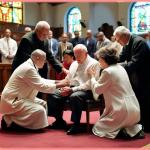Practical Spirituality series
How do you minister to the 18 to 30+ age group? Problems and answers.
“Get real” is the phrase I would use to describe new generations’ attitude toward spirituality and the church. It’s also the phrase I would use to describe many people’s attitude since around 1900 when the church attendance and membership started to decline as a percentage of the population.
Our pastor’s sermon this morning talked about the letter to the church in Sardis, which had become complacent. Adjectives used included people being sepulchers of the dead, stone white on the outside and empty on the inside. It’s like many churches today live in the Hotel California, trapped in comfortable thinking.
No more fake religion! No more fake spirituality.

But Jesus said, “Let the children alone, and do not hinder them from coming to Me; for the kingdom of heaven belongs to such as these.” – Matthew 19: 14 (NASB)
Love one another
Christians are to love one another. This doesn’t mean having a syrupy feeling about others. Love means being willing to assist each other. It means stop being so independent that you can’t even see other’s needs. Religion isn’t “It’s all about me!” Stop hiding from others and responsibility! Get real!
Many churches today are simply tombstones to religion. They’re empty buildings.
Transition
A major transition is taking place in religion and spirituality. The amount of people who won’t accept going through the motions of religion has reached critical mass. The amount of people who won’t accept injustice in religion has reached critical mass. These people are notably New Adults age 18 to 30, and late Millennials.
Critical juncture
This week marked a critical juncture in which mainline protestant religions in the US have accepted LGBTQ+, and stopped condemning it. Love triumphed over some ancient, twisted notion that was misinterpreted and had limited application.
UCC, Disciples of Christ, Presbyterian, Episcopal, Evangelical Lutheran Church and now Methodists. Methodists are the second largest denomination, are worldwide, and struggled with some churches who wanted to leave because they can’t accept LGBTQ and the African wing.
American Baptists have left this up to local churches. The Pope declared the Catholic Church is open to LGBTQ people. Judaism, except for fundamentalist Jews, have also accepted LGBTQ. Only Southern Baptists have rejected LGBTQ acceptance. It’s a wonderful start.
It’s only a start. Love opposes injustice. Generation Z won’t accept injustice and discrimination of any kind. The young have become leaders in spirituality.
Continued transition
The 1960s were a time of transition. One transition was opposition to government absolutism that came to a head in opposition to the war in Vietnam, which was known as the sausage mill for killing US soldiers. Students on college campuses demonstrated against that, and this eventually made the war unpopular among politicians.
War wasn’t the only issue. Anger fueled the Watts riots in response to the LAPD’s racist practices, employment discrimination, residential segregation, and poverty in L.A. Many of the rioters were young men sick of the discrimination and mistreatment. Those riots helped propel the government war on poverty. But these issues and demonstrations continue to this day.
Today students are demonstrating on campuses across the US and around the world. The killing of civilians, children, and babies in Gaza is beyond toleration. The deprivation of food and medical supplies have resulted in many deaths and famine. It’s inhumane.
For comparison, over several years the US killed 2% of innocent civilians in Baghdad, Iraq, which had a population of 7 million, while going door to door looking for terrorists. Medical and food supplies were less affected. In contrast, Israel in Gaza has killed about the same percentage in a much shorter period, but allows in less food and medical supplies, creating famine. And in the West Bank settlers continue to steal land through force, which is tolerated.
It’s time for the over 70 years of violence in Palestine to end with an equitable solution for all. Continued injustice is not acceptable.
This blog-article is the first of several about ministering to the spiritual needs of new generations.
Thinking outside the box
In working with new generations age 18 to 30, one of the difficult things to wrestle with is the age difference. College and career age has always been difficult to attract. They no longer go to church with their families. They feel they know their religion and have other concerns, filling their time with work and family. Many are avoiding church even in their youth, self-professed “nones” meaning having no religious affiliation, seeing religion as the problem and not the cure.
It’s difficult to bring babies and young children into services because of their needs, and behaviors that some find troublesome. (I would rather hear children and babies.) Often the services don’t resonate with them. Attending services would just be going through the motions.
People instinctively gravitate toward people who are like themselves. Age is a difference. The average age of 50 to 60 represents older thinking to this age group, which they reject. In fact, the mode, which is the age of most attendants, is likely a decade higher. It’s a perception problem that is difficult to overcome. And for many churches, it’s a reality problem. With many churches not being very welcoming because people seek out people like them, this age group is very hesitant to attend.
How do you address this age difference problem? Making the service more oriented to their age range is marginally helpful. For example, the absence of a guitar is usually correlated with no attendants in this age range. But the presence of a guitar doesn’t guarantee their attendance. It’s a lot more than guitars.
It’s the same with music style as with guitars. Around 50% of this age group like traditional music, and the other half like more modern music. A blend of both can work. I recommend bringing in the music of their lives, which is pop music since it represents their struggles, thinking, and celebrations. It’s very spiritually relevant. Attracting this age group is a lot more than guitars and music.
To fix this, start thinking in new ways. Start a new service. Find times that are convenient to New Adults and create a service. Go beyond the church walls and start a service in a different venue that has no baggage or stigma with it. The church walls aren’t as important as bringing Jesus and The Way to live to this age group.
It’s more challenging for rural churches than in cities. Cities have a much larger population to work with, so it’s easier to find workers and people who want to come. It’s also easier for cities to offer more helpful and relevant services. In some areas, churches band together.
Pastors get very frustrated with this idea of relevance. They reject it for their situation and hastily conclude that only the message of Jesus is relevant, giving up on further effort. This is sad and undermines others’ efforts.
Churches and religious organizations that engage this age group, Gen Z and late Millennials, offer multiple types of services to them. These aren’t just “religious” services focused on worship. They understand their needs and offer things that are relevant. We have a difficult time appreciating the nonexistent difference between secular and sacred. All life is sacred unless we make it about injuring or neglecting others. All reflect us.
Churches have too long been top-down organizations that decide what they think is best for others. They don’t have the privilege of deciding what people’s needs are. Their position has to become the opposite. Organizations have to start listening and responding in positive ways to meet needs.
Conclusion
It ain’t easy. For the past 150 years, with the intense focus of evangelicalism and growth by many, churches have placed their agenda in place of the spiritual needs of New Adults. The result has been the decline of the church at 1% a year as a percentage of the population, and it’s accelerating since 2001. Some relearning has to take place, and the result is likely to be a bonanza of people having their spiritual needs met.
Churches have to do some introspection and realize that religion isn’t just about “being saved.” It’s about the full range of human activity. All life is sacred unless we mistreat others. Injustice to others isn’t something that this age group will tolerate, and the church should be in the lead on speaking out and resolving injustice, not in the background.
What is relevant to this age group? On Connexions.life, I list many life skills that are relevant to this age group that are very necessary and engaging. Adopt the motto: be endlessly engaging. Spirituality is an essential. This age group wants genuine spirituality. If you share your faith genuinely, telling what is meaningful to you, and not spewing some ancient law, they will listen.
Our New Adults age 18 to 30+ are leading this. It’s essential that they continue to lead so that they are engaged, but they also need the wisdom of others who have already walked this path. The church has a place in their lives if it can be reshaped to represent Jesus and what they need.
The next several articles will be about ministering to this age group, including how to avoid projectile vomiting on them or chasing them away with a stick.
Probability Space
What probability spaces can we open in our minds to focus on how to be a light to show the love of God to others? Can we stop spouting religious talking points and be accepting of others? Can we listen to others’ needs and find ways to help? Can we make worship more meaningful? Is it possible to give people a smile and a warm welcome every day in order to convey acceptance?
Potential Space
If you think creatively and allow your mind to wander and explore, how can we make the world more just and fair?
We have issues with acceptance, discrimination, and religious intolerance. We have major problems with income inequality. These are important issues to this age group.
– Dorian
Our answer is God. God’s answer is us. Together we make the world better.












